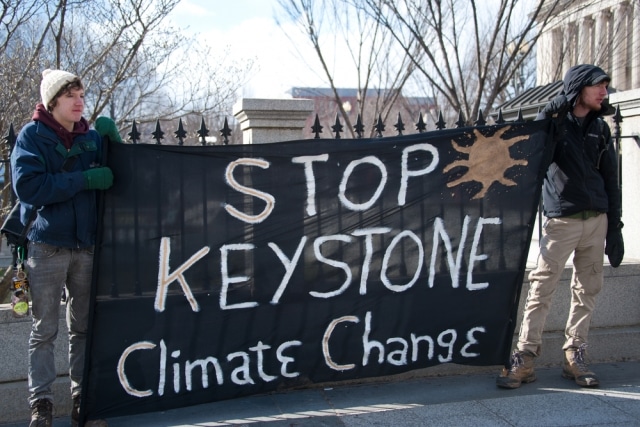Last week, supporters of the Keystone XL pipeline got all worked up about a study that purported to find that the delay in approving the project has actually increased greenhouse gas emissions.
The narrowly-focused study was based on faulty assumptions (that the tar sands would always find a way to market) and cherry-picked data (disregarding entirely any increases emissions that greater access to tar sands crude would create) in order to portray the pipeline project as positive for the climate. The five year or more delay in approving Keystone XL will ultimately increase carbon dioxide emissions by up to 7.4 million tons, argued the American Action Forum, a self-described “center-right policy institute.”
A study released this week by scientists at the Stockholm Environmental Institute shows just how misleading the American Action Forum claims really are.
If built, the Keystone XL pipeline would flood global oil markets with crude, increase demand, and dump as much as 110 million tons of carbon dioxide equivalent into the atmosphere every year, according to the study published in the journal Nature Climate Change.
This figure is a full four times higher than the State Department estimated in its final environmental review of the project.
The state department had figured that, at most, the pipeline would increase world carbon dioxide emissions by 30 million tons.
“The sole reason for this difference is that we account for the changes in global oil consumption resulting from increasing oil sands production levels, whereas the State Department does not,” wrote study authors Peter Erickson and Michael Lazarus, both scientists with the Stockholm Environment Institute.
The flawed State Department assumption — saying that the pipeline wouldn’t result in increased production of Canadian tar sands — is the same assumption used by the American Action Forum and other Keystone XL proponents when arguing that the oil will find its wa to market one way or another.
However, the oil industry and other energy experts have acknowledged that Keystone XL and other pipeline projects are crucial to the development of Alberta’s tar sands.
The CEO of tar sands giant Cenovus recently told The Globe and Mail that “if there were no more pipeline expansions, I would have to slow down.”
Joe Oliver, Canada’s Natural Resources Minister, said, “In order for crude oil production to grow, the North American pipeline network must be expanded through initiatives, such as the Keystone XL Pipeline project.”
The International Energy Agency has also stated that tar sands expansion “is contingent on the construction of major new pipelines.
“RBS Dominion Securities of Toronto claimed in the Globe and Mailthat up to 450,000 barrels a day of tar sands production could be put on hold between 2015 and 2017 if the Keystone pipeline is not approved.
The Stockholm Environment Institute study reinforces the argument made earlier this year by the Carbon Tracker Initiative that the State Department had severely underestimated Keystone XL’s impact on tar sands development. That study, covered here by DeSmogBlog, took the State Department’s own numbers, and used a rigorous economic analysis to find that the pipeline would increase global greenhouse gas emissions by roughly a whopping 5 gigatons over the course of its lifetime.
Image credit: Keystone XL protesters at the White House, by Rena Schild via Shutterstock.
Subscribe to our newsletter
Stay up to date with DeSmog news and alerts







